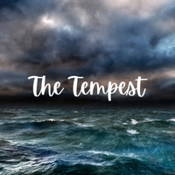
Overview
Synopsis
For twelve years, Prospero, the exiled Duke of Milan, has been living on a remote, uninhabited Mediterranean Island with only his daughter, Miranda (a young girl who has grown up seeing no other human being but her father), Caliban (the son of the island’s former ruler, a witch named Sycorax), and Ariel (an “airy spirit” who has served as Prospero’s servant). Prospero has learned the magical arts through deep meditative study, and uses his supernatural powers to exert his authority and influence events. At the play’s beginning, he causes a tempest to overtake the surrounding waters, shipwrecking the enemies responsible for his exile. The boat’s passengers are scattered, and the state of the island is thrown into chaos as murder plots, drunken foolery, and love-at-first-sight become the order of the day. But by the end, Prospero has righted the chaos and resolved all conflict, and asks the audience's indulgence to set him free. Likely Shakespeare's last independent play, The Tempest is a fitting capstone to the Bard's prolific career.
Show Information
Context
Scholars generally agree that The Tempest is Shakespeare’s last play written only by himself, and in fact many see Prospero’s Epilogue as Shakespeare’s farewell to the stage. Written in 1610 or 1611, The Tempest contains references to many of the Bard’s previous plays, and in fact the characters themselves seem to be influenced by his tragic heroes and comic reliefs.
Like Twelfth Night, Comedy of Errors, or The Merchant of Venice, a shipwreck sets in motion the events of _The
to read the context for The Tempest and to unlock other amazing theatre resources!Plot
King Alonso’s ship, sailing back to Naples following his daughter’s wedding in Tunis, is caught in a tempest. The mariners struggle to keep control of the vessel, and the Boatswain scolds the royals (Alonso, Gonzalo, Antonio, and Sebastian) for not keeping to their cabins. Even in the tumult of the storm, Gonzalo reminds the Boatswain who he is speaking to (a king) and that he cannot command those above him. The Boatswain dismisses this class system, a orders the royals out of his way. But the
to read the plot for The Tempest and to unlock other amazing theatre resources!Characters
| Name | Part Size | Gender | Vocal Part |
|---|---|---|---|
|
Lead |
Male |
Spoken |
|
|
Supporting |
Female |
Spoken |
|
|
Supporting |
Either Gender |
Non-singer |
|
|
Supporting |
Male |
Spoken |
|
|
Supporting |
Male |
Spoken |
|
|
Supporting |
Male |
Spoken |
|
|
Supporting |
Male |
Spoken |
|
|
Supporting |
Male |
Spoken |
|
|
Supporting |
Male |
Spoken |
|
|
Supporting |
Male |
Spoken |
|
|
Supporting |
Male |
Spoken |
|
|
Featured |
Female |
Spoken |
|
|
Featured |
Female |
Spoken |
|
|
Featured |
Female |
Spoken |
|
|
Featured |
Male |
Spoken |
|
|
Featured |
Male |
Spoken |
|
|
Featured |
Male |
Spoken |
|
|
Featured |
Male |
Spoken |
|
|
Ensemble |
Either or Both |
Spoken |
Songs
A song with an asterisk (*) before the title indicates a dance number; a character listed in a song with an asterisk (*) by the character's name indicates that the character exclusively serves as a dancer in this song, which is sung by other characters.
Monologues
Scenes
Key Terms
A type of foundation makeup used as the first layer in stage cosmetics to even out skin tone.
To phrase or express something in a particular way; in classical theatre, may also refer to a piece of stage furniture.
A concluding speech or section that provides commentary or closure at the end of a play.
A stage direction indicating that two or more characters leave the stage.
Used in classical texts to describe beauty or fairness; also used in dialogue to suggest sincerity or justice.
A poetic meter consisting of five iambs per line, widely used in English Renaissance drama by playwrights like Shakespeare.
Pertaining to the period of King James I’s reign, known for darker, more violent English drama than the Elizabethan era.
A servant or deceitful man, often used in Shakespearean plays as a term of insult or social rank. This archetype is common in comedic and villainous roles in English Renaissance drama, revealing class tensions and dramatic contrasts.
A form of festive court entertainment combining poetry, music, dance, and elaborate costumes, popular in 16th and 17th century England. Masques were often allegorical and featured aristocratic performers.
A speech delivered by a character alone on stage, revealing inner thoughts or emotions to the audience. Common in Shakespearean plays.
A genre blending elements of tragedy and comedy, often leaving audiences in emotional or thematic tension.
Videos
Quizzes
Themes, Symbols & Motifs
Sorry! We do not currently have learning modules for this guide.
Quote Analysis
Sorry! We do not currently have learning modules for this guide.

